#Potato Starch
Explore tagged Tumblr posts
Text
I had a flat-earther science teacher who brought in Ellen to prove potato starch wasn't carbon based by putting an apple into a beaker full of Coca Cola.
3K notes
·
View notes
Text

Apple Butter Snickerdoodle Cookies (Vegan + GF)
#apple butter#snickerdoodles#cookies#vegan#gluten free#egg free#dairy free#cinnamon#autumn#winter#halloween#christmas#recipe#apple#fruit#potato starch#almond flour#nuts#almond#tapioca free#minimalistbaker
220 notes
·
View notes
Text
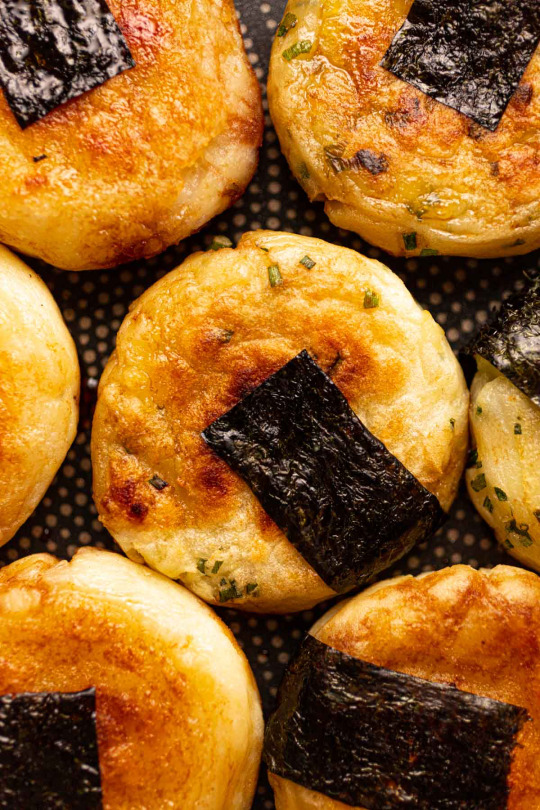

Easy Vegan Potato Mochi (Sweet or Salty Snack)
#vegan#snacks#appetizer#mochi#potato#potato starch#nori#vegan butter#soy sauce#mirin#coconut sugar#sesame oil#sea salt
124 notes
·
View notes
Text

Passover Lemon Meringue Pie (via Truffles and Trends)
#gluten free#gf food#gluten free foods#dairy free#dessert#soy free#grain free#passover#lemon#potato starch#almond flour#trufflesandtrends#kosher
8 notes
·
View notes
Text
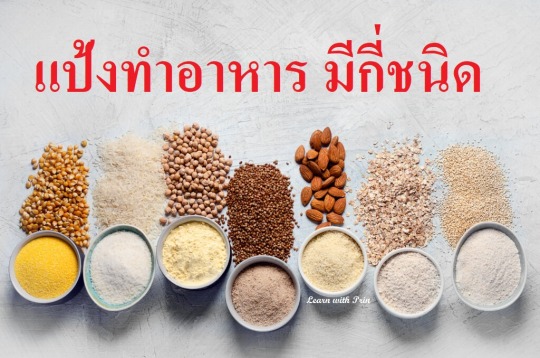
“แป้งทำอาหาร" มีกี่ชนิด
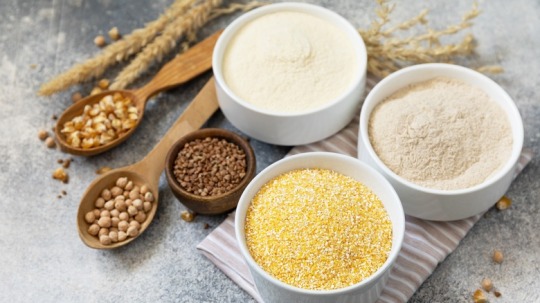
“แป้งทำอาหาร" มีกี่ชนิด
แป้งทำอาหาร มีกี่ชนิด แป้งชนิดไหนเหมาะจะนำมาทำอะไร เราไปดูกันเลยค่ะ
1. แป้งข้าวเจ้า (Rice flour)
แป้งข้าวเจ้า หรือบางทีก็เรียกว่า แป้งญวณ ทำมาจาก เมล็ดข้าวจ้าว จับแล้วสากมือ เมื่อใช้มือสัมผัสจะมีความหยาบเล็กน้อย แต่สากมือกว่าแป้งสาลี พอทำให้สุก���ล้วตัวแป้งจะมีสีขาวขุ่น จับตัวกันเป็นก้อน เหมาะสำหรับนำไปทำอาหารที่ต้องการความอยู่ตัว เนื้อขนมจะมีความแข็งร่วน
เมนูที่ทำจากแป้งข้าวจ้าว ได้แก่ ขนมกล้วย ขนมเบื้อง ขนมดอกจอก ลอดช่อง ขนม ขนมตาล ขนมชั้น ขนมถ้วยตะไล (ขนมถ้วย) ซึ่งแป้งข้าวเจ้าถือว่าเป็นแป้งที่ถูกนำมาทำขนมไทยมากที่สุด
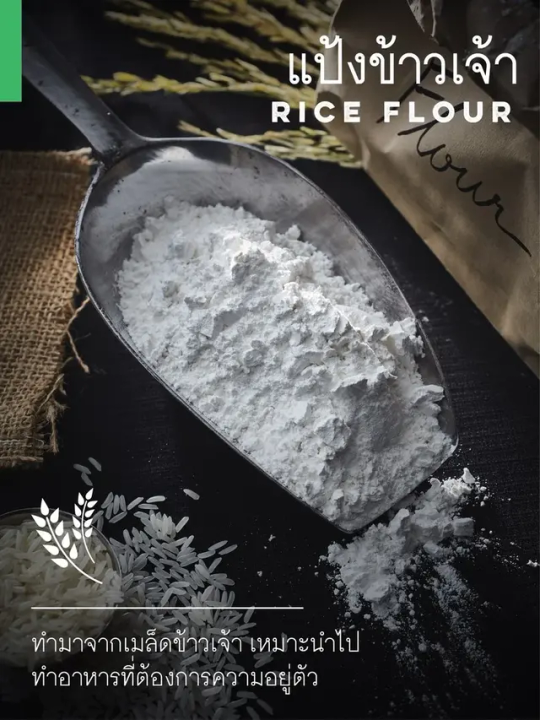
แป้งข้าวเจ้า
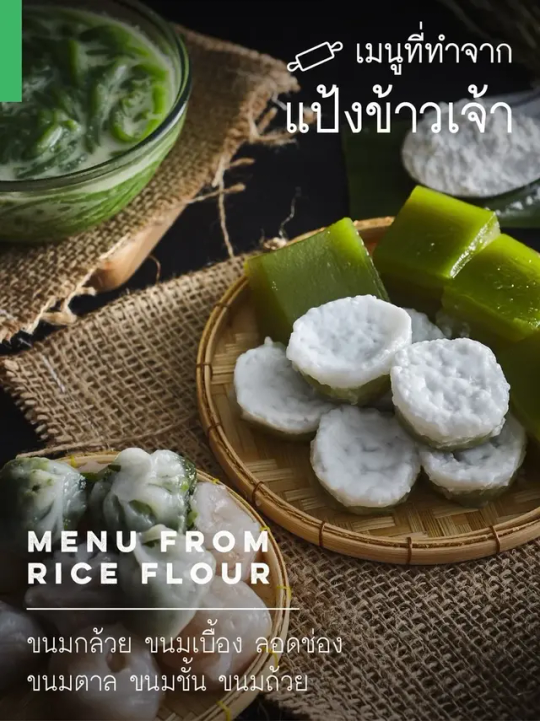
เมนูที่ทำจากแป้งข้าวจ้าว
2. แป้งข้าวเหนียว (Glutinous flour)
แป้งข้าวเหนียว ทำมาจากเมล็ดข้าวเหนียว มีลักษณะคล้าย ๆ กับแป้งข้าวเจ้าคือเป็นผงสีขาวๆ เมื่อใช้มือสัมผัสจะมีความหยาบเล็กน้อยกว่าแป้งข้าวเจ้า พอทำให้สุกแล้วตัวแป้งจะมีสีขาวขุ่นข้น มีความเหนียว
เมนูที่ทำจากแป้งข้าวเหนียว ได้แก่ ขนมต้ม บัวลอย ขนมถั่วแปบ ข้าวเหนียวตัด ขนมเทียน ขนมเข่ง ข้าวเหนียวเปียก ขนมบ้าบิ่น ขนมโก๋ แป้งจี่ ขนมโค ซึ่งบางเมนูที่ไม่ต้องการความเหนียวมากนักก็ให้ผสมแป้งข้าวเจ้าลงไปค่ะ
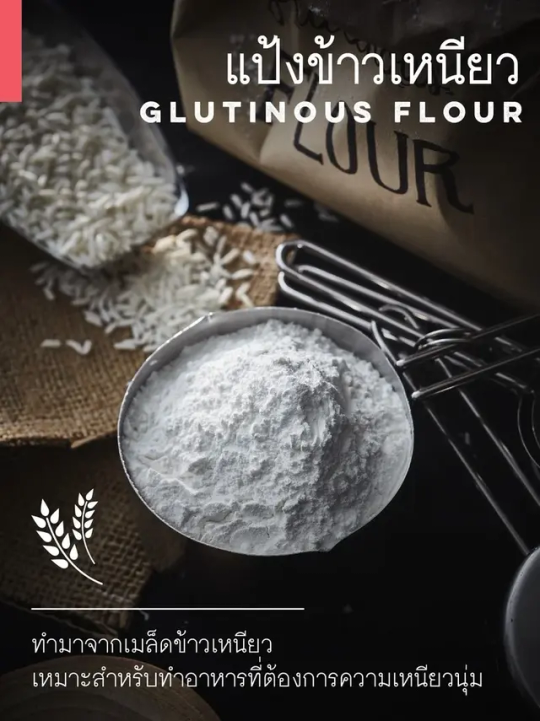
แป้งข้าวเหนียว

เมนูที่ทำจากแป้งข้าวเหนียว
3. แป้งมันสำปะหลัง (Tapioca starch / Cassava starch)
แป้งมันสำปะหลังหรือแป้งมัน บางทีก็เรียกว่า แป้งมันสิงคโปร์ ทำมาจาก หัวมันสำปะหลัง เป็นผงสีขาว เนื้อแป้งมีความละเอียด ลื่นมือ เมื่อถูกทำให้สุกแล้วตัวแป้งจะเหนียวหนืด มีสีใส เหมาะกับการนำไปทำอาหารที่มีความเหนียวแต่ใสและดูขึ้นเงา แต่ข้อเสียของแป้งมันสำปะหลังคือ เมื่อถูกทำให้เย็นลงจะคืนตัวง่ายมาก จึงมีการนำแป้งชนิด���ื่นมาผสมเพื่อทำให้ขนมมีความเหนียวนุ่มขึ้น
เมนูที่ทำจากแป้งมันสำปะหลัง ได้แก่ ลอดช่องสิงโปร์ เต้าส่วน บัวลอย ครองแครงแก้ว ทับทิมกรอบ ขนมชั้น ขนมปลากริมไข่เต่า เป็นต้น ส่วนอาหารคาว ได้แก่ กุยช่ายทอดหรือหอยทอด ซึ่งต้องผสมแป้งผสมแป้งสาลีลงไปเพื่อให้ได้ความกรอบและนุ่ม เพราะถ้าใช้แป้งมันสำปะหลังอย่างเดียวอาหารทอดจะไม่กรอบ
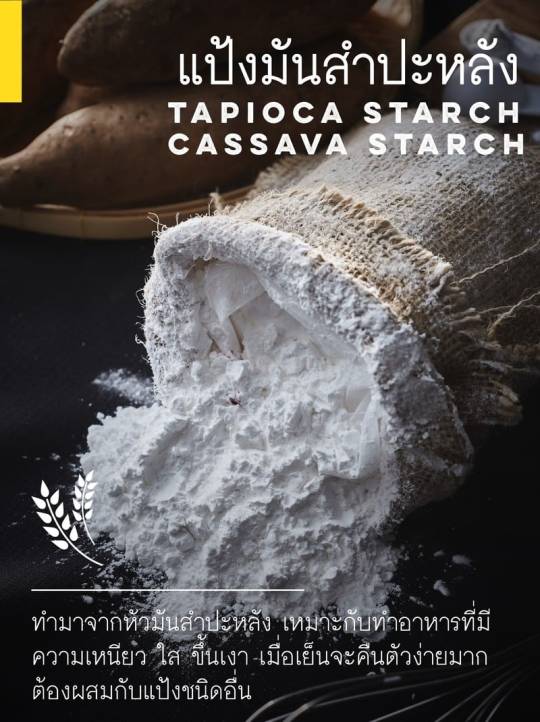
แป้งมันสำปะหลังหรือแป้งมัน

เมนูที่ทำจากแป้งมันสำปะหลัง
4.1. แป้งข้าวโพด บดละเอียด (Corn starch)
แป้งข้าวโพด บดละเอียด ทำมาจากเมล็ดข้าวโพด เป็นผงสีขาวเหลืองนวล เนื้อแป้งเนียนและลื่นมือ ข้อดีของแป้งข้าวโพดคือ เมื่อถูกทำให้สุกแล้วเนื้อแป้งจะข้นเหนียว มีความใสและไม่คืนตัว
เมนูที่ทำจากแป้งข้าวโพด บดละเอียด ได้แก่ ราดหน้า ไส้ขนม รวมถึงซอสต่างๆ ด้วย
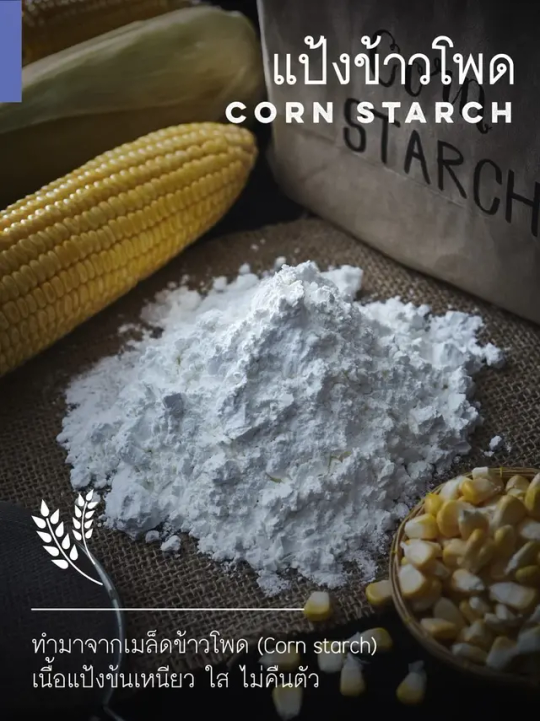
แป้งข้าวโพด บดละเอียด
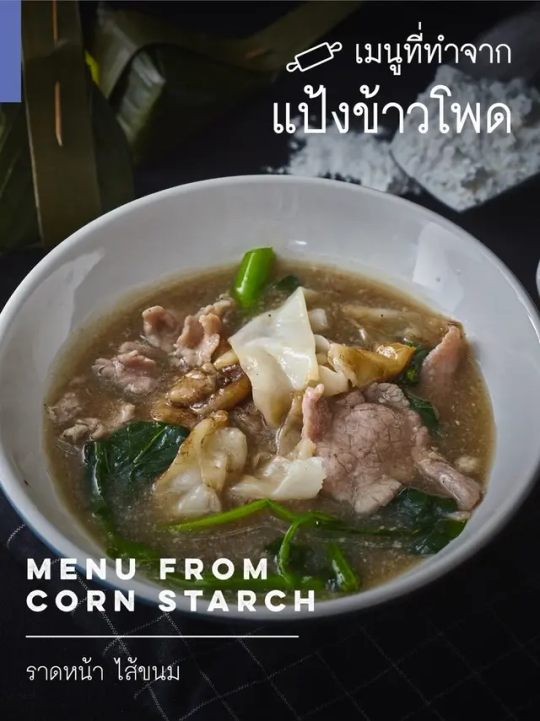
เมนูที่ทำจากแป้งข้าวโพด บดละเอียด
4.2. แป้งข้าวโพด บดหยาบ (Corn Meal)
แป้งข้าวโพด บดหยาบ ทำมาจากเมล็ดข้าวโพดบด แต่ไม่ละเอียดเท่ากับ Corn starch เนื้อจะหยาบกว่า
เมนูที่ทำจากแป้งข้าวโพด บดหยาบ (Corn Meal) ได้แก่ มัฟฟิน และขนม
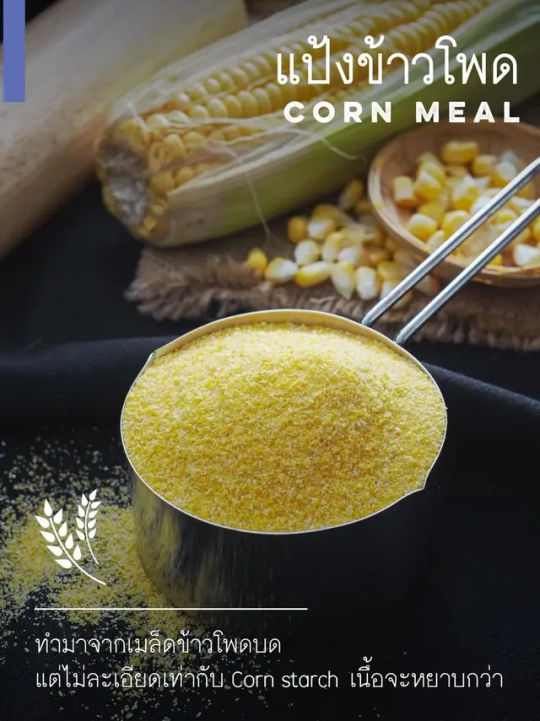
แป้งข้าวโพด บดหยาบ

เมนูที่ทำจากแป้งข้าวโพด บดหยาบ
5. แป้งเท้ายายม่อม (Arrowroot Starch)
แป้งเท้ายายม่อม ��ำมาจากหัวมันเท้ายายม่อม เป็นแป้งที่มีราคาสูงกว่าแป้งชนิดอื่นๆ เพราะหัวมันเท้ายายม่อมนั้นสามารถเก็บเกียวได้แค่ปีละครั้ง แถมวิธีการทำแป้งก็ค่อนข้างยุ่งยากซับซ้อน ตัวแป้งจะมีลักษณะเป็นเมล็ดสี่เหลี่ยมเล็กๆ สีขาว เนื้อสัมผัสจะมีความหยาบมากเมื่อเทียบกับแป้งชนิดอื่นๆ ก่อนนำมาทำอาหารต้องนำมาบดให้ละเอียดและร่อนเสียก่อน เมื่อโดนความร้อนจนสุกแล้ว ตัวแป้งจะมีลักษณะข้น เหนียวหนืดและมีความใส นิยมนำมาผสมกับแป้งชนิดอื่นแล้วนำไปทำอาหารที่ต้องการความข้นเหนียวและมันวาว
เมนูที่ทำจากแป้งเท้ายายม่อม ได้แก่ ขนมชั้น ขนมเปียกปูน ขนมน้ำดอกไม้ ลอดช่องต่างๆ แต่จะต้องผสมกับแป้งข้าวเจ้าลงไปด้วย
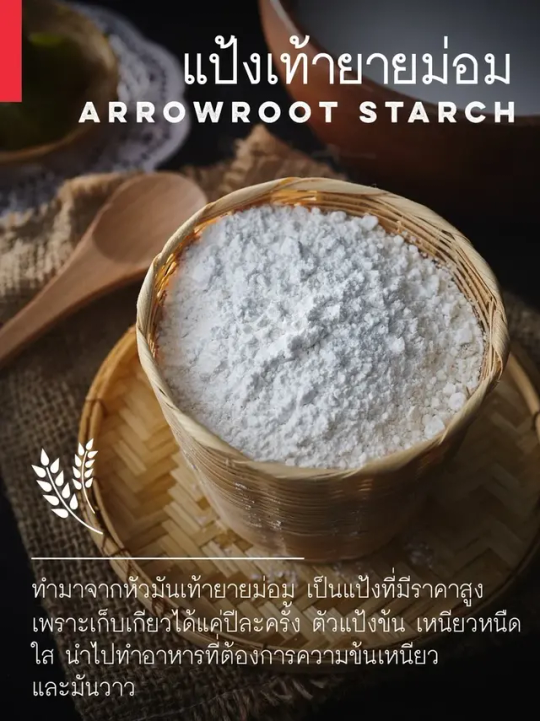
แป้งเท้ายายม่อม
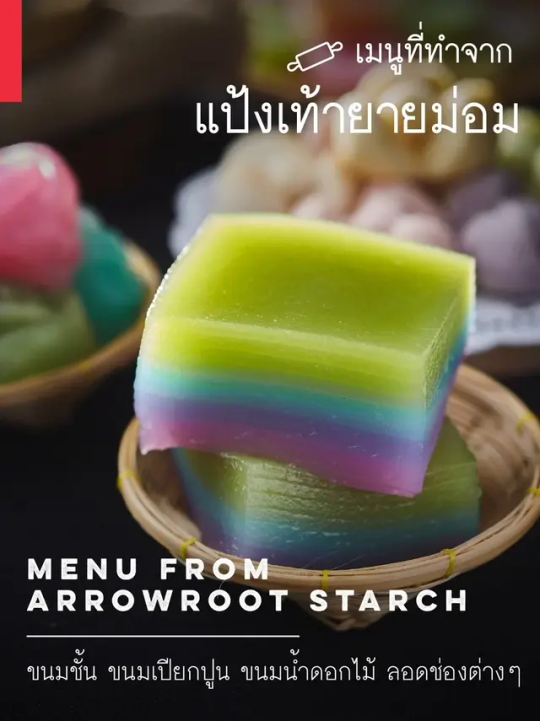
เมนูที่ทำจากแป้งเท้ายายม่อม
6. แป้งถั่วเขียว (Mung bean Starch)
แป้งถั่วเขียว ทำมาจากเมล็ดถั่วเขียว เป็นผงสีขาว เนื้อแป้งสากมือเล็กน้อย ตัวแป้งเมื่อสุกแล้วจะมีลักษณะใสคล้ายกับวุ้น มีความมันเงา เมื่อพักให้เย็นตัวลงก็จะจับตัวเป็นก้อนแข็งแต่เด้ง อยู่ตัว
เมนูที่ทำจากแป้งถั่วเขียว ได้แก่ อาหารที่มีความอยู่ตัว อย่าง ตะโก้ ซ่าหริ่ม ลอดช่องแก้ว ขนมลืมกลืน
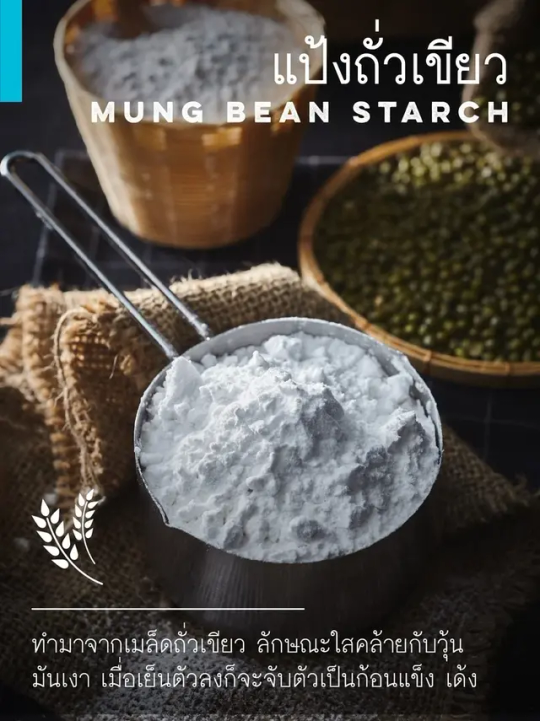
แป้งถั่วเขียว
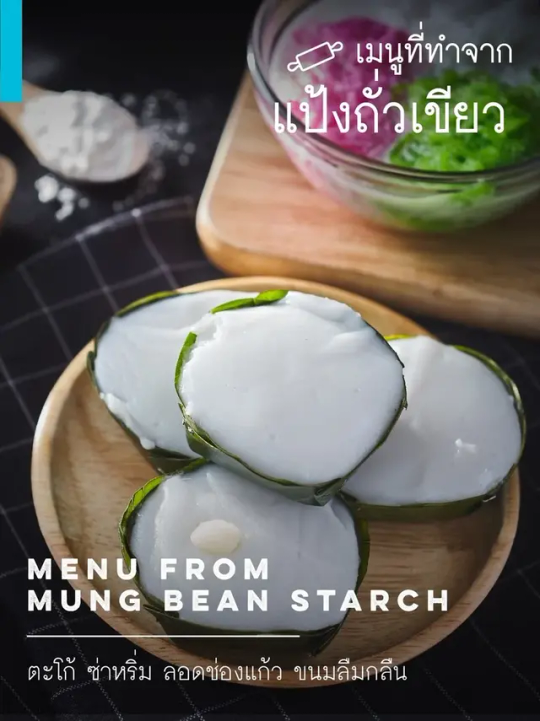
เมนูที่ทำจากแป้งถั่วเขียว
7.1. แป้งสาลีสำหรับทำขนมปัง (Bread Flour / Hard Flour)
แป้งสาลีสำหรับทำขนมปัง ลักษณะเป็นผงสีขาวนวล เมื่อเอามือจับดูเนื้อจะค่อนข้างหยาบ ทำมาจากข้าวสาลีชนิดหนัก มีปริมาณโปรตีน 12-13%
เมนูที่ทำจากแป้งสาลีทำขนมปัง ได้แก่ โดนัทยีสต์ ปาท่องโก๋ โรตี พิซซ่า หรือเมนูทำขนมปังต่างๆ เพราะแป้งชนิดนี้จะดูดซับน้ำได้ดี มีความเหนียวและยืดหยุ่นดี

แป้งสาลีสำหรับทำขนมปัง

เมนูที่ทำจากแป้งสาลีทำขนมปัง
7.2. แป้งสาลีอเนกประสงค์ (All purpose Flour)
แป้งสาลีอเนกประสงค์ เนื้อแป้งจะละเอียดกว่าแป้งสาลีชนิดที่ใช้ทำขนมปังเล็กน้อย ราคาถูกกว่า ทำมาจากข้าวสาลีชนิดหนักและชนิดเบาผสมกัน มีปริมาณโปรตีน 9-10%
เมนูที่ทำจากแป้งสาลีทำอเนกประสงค์ ไม่ว่าจะเป็นอาหารและขนมต่างๆ เช่น แพนเค้ก คุ้กกี้ พาย โดนัท กะหรี่พัฟ รวมทั้งยังสามารถนำไปผสมน้ำเพื่อชุบอาหารต่างๆ ก่อนนำไปทอด
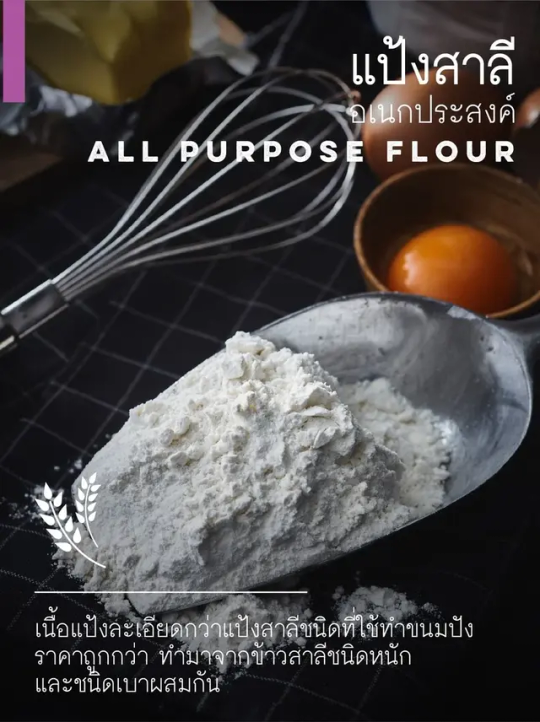
แป้งสาลีอเนกประสงค์

เมนูที่ทำจากแป้งสาลีทำอเนกประสงค์
7.3. แป้งสาลีสำหรับทำเค้ก (Cake Flour / Soft Flour)
แป้งสาลีสำหรับทำเค้ก บางคนอาจเรียกว่าแป้งเค้ก เนื้อแป้งมีสีขาวนวล และมีความเนียนละเอียดกว่าแป้งสาลีชนิดอื่น ๆ ดูดซับน้ำไม่ค่อยดี ไม่ค่อยเหนียวเมือเทียบกับแป้งทำขนมปัง ทำมาจากข้าวสาลีชนิดเบา มีปริมาณโปรตีน 6-9%
เมนูที่ทำจากแป้งสาลีสำหรับทำเค้ก สามารถนำไปทำขนมเค้กทุกชนิด ส่วนเมนูที่ทำจากแป้งสาลีสำหรับทำเค้ก ได้แก่ ขนมปุยฝ้าย ขนมกลีบลำดวน ขนมสาลี่
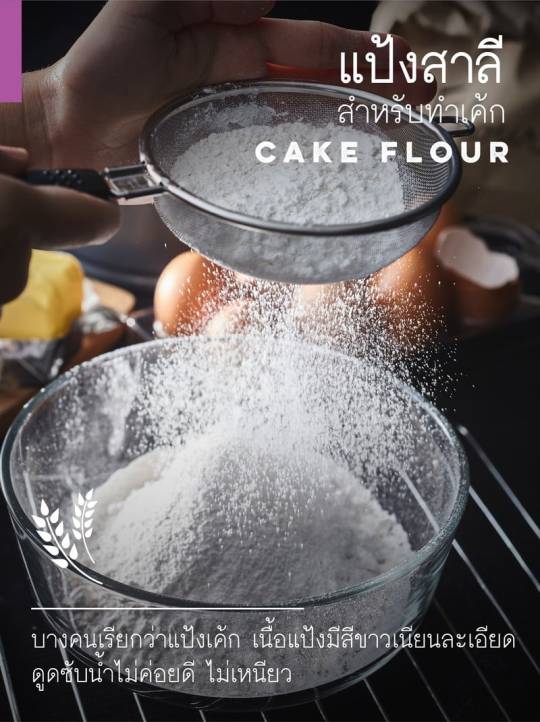
แป้งสาลีสำหรับทำเค้ก

เมนูที่ทำจากแป้งสาลีสำหรับทำเค้ก
8. แป้งมันฮ่องกง (Potato starch)
แป้งมันฮ่องกง ชื่อนี้อาจจะไม่ค่อยคุ้นหู เป็นแป้งที่ทำจากมันฝรั่ง ตัวแป้งเมื่อสุกแล้วจะมีความเหนียวข้น สีใสกว่าแป้งมันสำปะหลังหรือแป้งข้าวโพด ข้อดีของแป้งมันฮ่องกงจะมีความเหนียวไม่คืนตัว แม้จะเย็นตัวลงแล้วก็จะคงความเหนียว
เมนูที่ทำจากแป้งมันฮ่องกง ส่วนใหญ่มักจะเป็นเมนูอาหาร อย่าง ราดหน้า เป็นแป้งที่คนจีนนิยมใช้ในการทำอาหาร
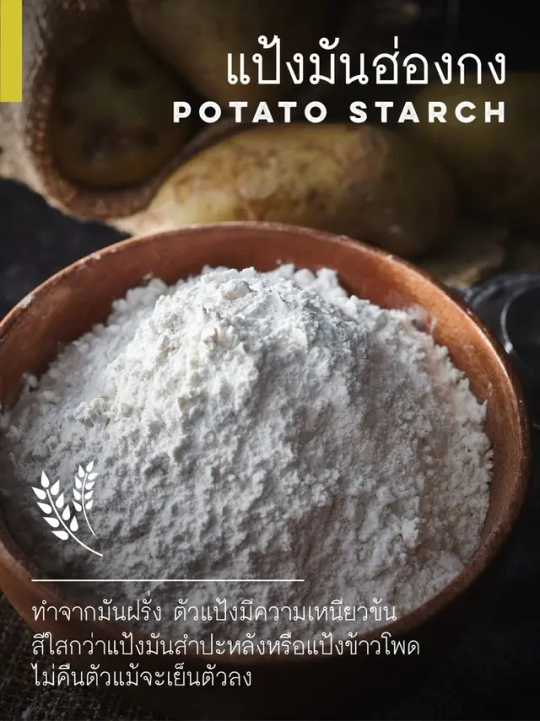
แป้งมันฮ่องกง
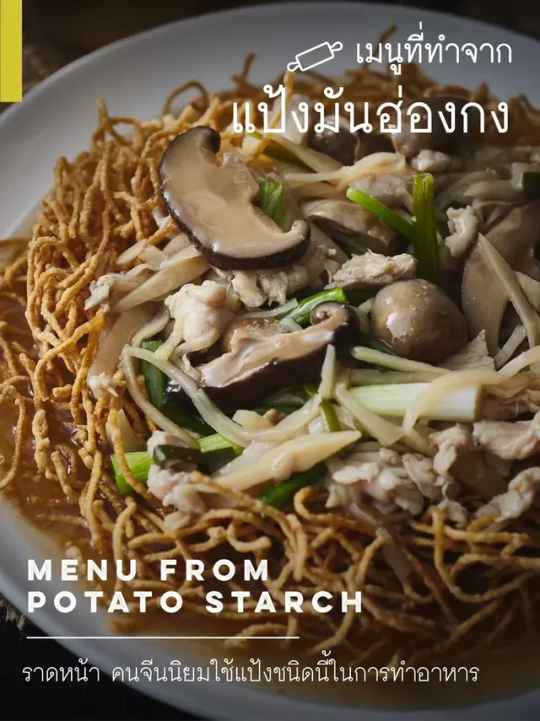
เมนูที่ทำจากแป้งมันฮ่องกง
แป้งข้าวเจ้า , Rice flour , แป้งข้าวเหนียว , Glutinous flour , แป้งมันสำปะหลัง , Tapioca starch , Cassava starch , แป้งข้าวโพด บดละเอียด , Corn starch , แป้งข้าวโพด บดหยาบ , Corn Meal , แป้งเท้ายายม่อม , Arrowroot Starch , แป้งถั่วเขียว , Mung bean Starch , แป้งสาลีสำหรับทำขนมปัง , Bread Flour , Hard Flour , แป้งสาลีอเนกประสงค์ , All purpose Flour , แป้งสาลีสำหรับทำเค้ก , Cake Flour , Soft Flour , แป้งมันฮ่องกง , Potato starch , Types Of Flour
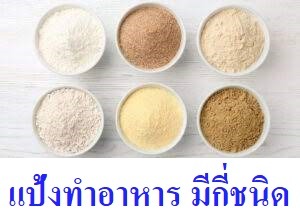
Cr. http://www.thaikasetsart.com/ , https://www.wongnai.com/food-tips/types-of-flour ,
#แป้งข้าวเจ้า#Rice flour#แป้งข้าวเหนียว#Glutinous flour#แป้งมันสำปะหลัง#Tapioca starch#Cassava starch#แป้งข้าวโพด บดละเอียด#Corn starch#แป้งข้าวโพด บดหยาบ#Corn Meal#แป้งเท้ายายม่อม#Arrowroot Starch#แป้งถั่วเขียว#Mung bean Starch#แป้งสาลีสำหรับทำขนมปัง#Bread Flour#Hard Flour#แป้งสาลีอเนกประสงค์#All purpose Flour#แป้งสาลีสำหรับทำเค้ก#Cake Flour#Soft Flour#แป้งมันฮ่องกง#Potato starch#แป้งทำอาหาร มีกี่ชนิด#Types Of Flour
2 notes
·
View notes
Text



[It's pretty much potato starch... You own nothing? Did you get the joke?]
#s27e01 sandwiches spaetzle and wings#guy fieri#guyfieri#diners drive-ins and dives#potato starch#joke
2 notes
·
View notes
Text
Let's check in on science today and

huh. okay then:
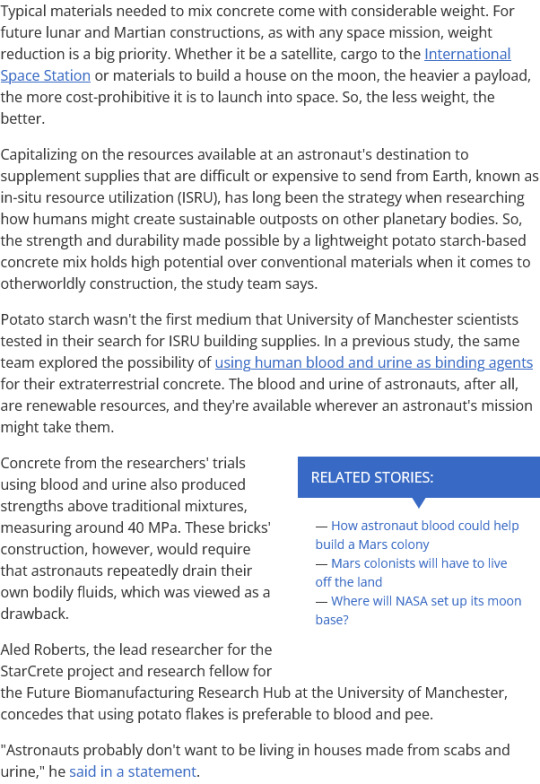
Astronauts probably don't want to be living in houses made from scabs and urine.
Science says so.
#my next d&d villain is living in a house made of scabs and urine#honestly this is a really interesting concrete with applications well beyond extraterrestrial construction#but also ew#potato starch#concrete#engineering#space#space news#science#science news#news you can use (for horrifying construction)
16 notes
·
View notes
Text
Food chemistry
If you cook and then cool a starchy food (rice, potatoes) you get… resistant starch! Resistant starch is easier on your blood sugar, and better for your digestive biome. It stays that way even if you heat it up again.
#This blog is not what I thought it would be#potato starch#corn starch#rice#potatoes#i want to write#i have no inspiration#bear with me#science#food science#food#i love potatoes#i am out of tag ideas#I'll fix it later
1 note
·
View note
Text
Caprese cake recipe - The GialloZafferano Recipe
Caprese cake recipe – The GialloZafferano Recipe Podcast Recipe Duration 3:06 – Steps 9 It is said that the best ideas are born from mistakes and this is precisely what has often happened to the greatest in history. Even in the kitchen, certain mistakes have made someone’s fortune. An example of this is the Caprese cake, the dessert invented by Carmine Di Fiore, around 1920, who forgot to add…
#50% dark chocolate#Albums#Baking powder for cakes#Bitter cocoa powder#butter#Caprese cake#cooked#It goes up fine#kitchen#Peeled almonds#Potato starch#Powdered sugar#recipe#Recipes#Vanilla pod#Whole peeled hazelnuts#Yolks
0 notes
Text
Potato Starch Prices | Pricing | Trend | News | Database | Chart | Forecast
Potato Starch is a widely used ingredient in various industries, from food production to textiles and pharmaceuticals. The price of potato starch is influenced by a number of factors that fluctuate throughout the year, including supply and demand dynamics, weather conditions, production costs, and global trade policies. One of the most significant elements affecting potato starch prices is the supply of raw potatoes. Since potato starch is derived from the tubers of potatoes, any factors that affect potato crops, such as drought, excessive rainfall, or disease, can have a direct impact on the availability of potato starch, driving prices up or down depending on the severity of the situation. For example, if a major potato-growing region experiences adverse weather conditions, it could reduce the yield of the crop, thereby limiting the supply of potatoes available for starch production and pushing prices higher.
The cost of production also plays a crucial role in determining potato starch prices. Energy costs, labor, and the price of other inputs such as fertilizers and water all contribute to the final price of potato starch. In regions where energy costs are high, or where labor is expensive, potato starch manufacturers may have to pass these increased costs onto consumers, resulting in higher prices for the end product. Furthermore, the cost of transporting potato starch from manufacturing facilities to end-users also adds to the final price. Since potato starch is produced in large quantities in certain regions and exported globally, fluctuations in fuel prices can significantly affect transportation costs. A spike in oil prices can lead to higher shipping and logistical expenses, which in turn raise the price of potato starch in international markets.
Get Real Time Prices for Potato Starch: https://www.chemanalyst.com/Pricing-data/potato-starch-1486
Global trade policies and tariffs also have a significant impact on potato starch prices. In some cases, countries impose tariffs on imported potato starch to protect domestic producers, which can raise the cost of the product for foreign buyers. Changes in trade agreements, import-export restrictions, and geopolitical tensions can create uncertainty in the market, leading to price volatility. For instance, if a country that is a major exporter of potato starch decides to limit its exports, it could create a supply shortage in global markets, leading to higher prices. Conversely, if a new trade deal is struck that reduces tariffs or opens up new markets, it could increase the availability of potato starch, putting downward pressure on prices.
Demand for potato starch also fluctuates depending on its various applications. In the food industry, potato starch is used as a thickening agent, a stabilizer, and a binder in a variety of products, including sauces, soups, processed meats, and baked goods. When there is high demand for these food products, the demand for potato starch also rises, potentially driving up prices. Conversely, if demand in the food industry declines, perhaps due to changes in consumer preferences or economic downturns, the price of potato starch may decrease as a result of lower demand. In addition to its use in the food industry, potato starch is also widely used in non-food industries such as the paper, textile, and pharmaceutical industries. Changes in demand in these sectors can also impact the overall market for potato starch. For example, if the demand for paper products increases, the paper industry may require more potato starch for its manufacturing processes, potentially raising prices.
Another factor that influences the price of potato starch is the availability of substitutes. Other starches, such as corn starch, tapioca starch, and wheat starch, can often be used as alternatives to potato starch in many applications. If the price of potato starch rises too high, manufacturers may switch to these alternatives, reducing the demand for potato starch and putting downward pressure on prices. Conversely, if the prices of substitute starches rise, it could lead to an increase in demand for potato starch, driving prices up.
The international market for potato starch is highly competitive, with major producers in Europe, North America, and Asia vying for market share. Europe, particularly countries like Germany, the Netherlands, and Poland, is one of the largest producers and exporters of potato starch. The competitiveness of European producers, due to their advanced processing technologies and efficient production methods, often influences global prices. On the other hand, countries like China are also major players in the potato starch market, with rapidly expanding production capabilities that can impact global supply. As production increases in countries with lower production costs, global potato starch prices may be pressured downward due to increased competition.
Seasonality is another important factor in the potato starch market. Potato harvesting and starch production tend to be concentrated in certain months of the year, which can lead to fluctuations in supply and prices. During the peak harvesting season, when the supply of fresh potatoes is abundant, potato starch prices may decline due to increased availability. However, during the off-season, when there are fewer fresh potatoes available, prices may rise as processors rely on stored potatoes, which can be more expensive due to storage and preservation costs.
The outlook for potato starch prices in the future will likely depend on a combination of these factors. As the world becomes increasingly interconnected, global trade policies, production costs, and demand dynamics in different regions will continue to influence the price of potato starch. Technological advancements in starch extraction and processing may also play a role in reducing production costs and improving efficiency, which could help stabilize prices in the long run. At the same time, the growing interest in sustainability and environmentally friendly production methods may drive demand for potato starch as a natural, renewable resource, which could lead to an increase in prices if demand outstrips supply.
In conclusion, the price of potato starch is shaped by a complex interplay of factors, including agricultural conditions, production costs, trade policies, global demand, and competition from alternative starches. As these variables continue to evolve, potato starch prices are likely to experience fluctuations, reflecting the changing dynamics of both the supply and demand sides of the market. For manufacturers and consumers alike, keeping an eye on these trends is essential to understanding and anticipating movements in potato starch prices.
Get Real Time Prices for Potato Starch: https://www.chemanalyst.com/Pricing-data/potato-starch-1486
Contact Us:
ChemAnalyst
GmbH - S-01, 2.floor, Subbelrather Straße,
15a Cologne, 50823, Germany
Call: +49-221-6505-8833
Email: [email protected]
Website: https://www.chemanalyst.com
#Potato Starch#Potato Starch Price#Potato Starch Prices#Potato Starch Pricing#Potato Starch News#Potato Starch Price Monitor#Potato Starch Database#Potato Starch Price Chart
0 notes
Text
Bluecraft Agro: Leading Starch Manufacturers in India for Food Grade Solutions
Bluecraft Agro stands out among starch manufacturers in India, offering premium food grade starch for diverse applications. Their innovative processing ensures the highest quality starch, perfect for use in food products requiring enhanced texture and stability. As one of the top starch manufacturers in India, Bluecraft Agro ensures that their food grade starch meets stringent safety standards, catering to the growing demand for natural ingredients. With a commitment to sustainability, they produce eco-friendly starches derived from maize, tapioca, and other plants. Starch manufacturers in India like Bluecraft Agro are setting new benchmarks for quality and innovation in the food industry.
#food grade starch#starchmanufacturer#bluecraftagro#maize starch#manufacturer#specialty starch brands#corn starch#ingredientsforahappylife#bluecraft#corn starch manufacturers in gujarat#maize starch supplier#food starch#potato starch
0 notes
Text

Lukash is the potato starch king.
0 notes
Text

Gluten Free Pretzel Bagels (with Sourdough Discard)
#gluten free#pretzel bagels#bagels#pretzel#breakfast#salted#baking#bread#recipe#sourdough#tea time#snack#brown rice flour#tapioca starch#potato starch#tapioca#sorghum flour#theglutenfreeaustrian
205 notes
·
View notes
Text

Crispy Vegan Hash Browns (Baked, Fried, or Air Fried)
#vegan#breakfast#appetizer#hash browns#air fryer#potato#onion#paprika#potato starch#olive oil#black pepper#sea salt
49 notes
·
View notes
Text

GF King Cake (via Let Them Eat GF Cake)
#gluten free#gf food#gluten free foods#dessert#cakes#flour mix#potato starch#white rice flour#tapioca starch#xanthan gum#cream cheese#cinnamon#mardi gras#holidays#letthemeatgfcake
56 notes
·
View notes
Text
0 notes